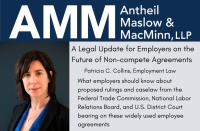In March of 2023, the FTC filed an administrative complaint against Anchor Glass Container Corporation (“Anchor Glass”), alleging that Anchor Glass used post-employment covenants not to compete unfairly to restrict employees’ freedom to accept employment with competing businesses or otherwise to compete with the employer. The non-compete agreement at issue imposed a one-year restriction on the employee, requiring the employee to refrain from being employed by or working for any company in the United States providing the same or substantially similar sales and services as Anchor Glass. Over 300 employees were subject to this restriction. The FTC argued that Anchor Glass’s use of non-compete agreements violated Section 5 of the Federal Trade Commission Act, 15 U.S.C. § 45.
This was not the first time the FTC had filed such a complaint. The FTC filed similar complaints against Prudentail Security, Inc, Prudential Command Inc., O-I Glass Inc., and Ardagh Group S.A.. Each of these entities agreed to consent orders, similar to a consent order entered by the FTC and Anchor Glass.
Anchor Glass and the FTC entered into an Agreement and Consent Order, which was approved by the FTC in June of 2023. Pursuant to the terms of the Consent Order, Anchor Glass was ordered to cease and desist from entering into, maintaining, enforcing or threatening to enforce its non-compete agreements (and from attempting to do any of these things). The order required Anchor Glass to provide each employee subject to a non-compete agreement a copy of the Consent Order, and a letter in a form prescribed by the order advising the employee that they were no longer subject to a non-compete restriction. The letter did remind the employee that they were still subject to an obligation to avoid using or disclosing confidential information. The Consent Order also requires Anchor Glass to provide notice to employees that they will not be subject to a non-compete restriction. In addition, Anchor Glass is required to take all steps to void existing non-compete agreements. The order prohibits Anchor Glass from requiring any employee to repay any remuneration provided along with the non-compete agreement. The Consent Order imposes compliance and reporting obligations on Anchor Glass as well.
The Consent Order resulted in the nullification of three hundred non-compete agreements. But the FTC was not done. On September 23, 2023, the FTC and the United States Department of Labor (“DOL”) announced a Memorandum of Understanding (“MOU”) regarding joint activities to protect workers who have been harmed or may be at risk of being harmed by a list of practices, including “the imposition of one-sided and restrictive contract provisions, such as noncompete and nondisclosure provisions.” The MOU also recited a litany of other “unfair or deceptive acts or practices including collusive behavior, employee misclassification, illegal claims and disclosures about earnings and costs associated with work and the impact of algorithmic decision-making on workers.” The MOU announced that the agencies would engage in coordinated investigations and enforcement, including exchanging information regarding “general patterns of conduct” and referral of potential violations of the other agency’s laws. The agencies will share information, including nonpublic information, pursuant to certain conditions.
This activity from the FTC and DOL suggest that large employers using non-competes for large groups of employees are at risk not only of an FTC complaint, but of complaints based on referrals to DOL. Likewise, DOL investigations of wage and hour violations or employee misclassification complaints could result in a referral to the FTC regarding the use of non-compete agreements.
Not to be left out of the fray, the National Labor Relations Board General Counsel announced on May 30, 2023 that some non-compete agreements violated the National Labor Relations Act (“NLRA”), leaving employers at risk for claims of unfair labor practice charges in the use of non-compete agreements. The Memorandum asserts that non-compete agreements could chill employees from exercising their rights under the NLRA when the non-compete could “reasonably be construed by employees” to deny them the ability to quit or change jobs. Because employees will believe that they are unable to find new employment, they are less likely to exercise their rights under the NLRA for fear of discharge.
Litigants and the courts have weighed in as well. In Globus Medical v. Jamison (22-CV-282), a case pending in the United States District Court for the Eastern District of Virginia, Norfolk Division, the defendants relied on the FTC’s proposed final rule to argue that the imposition of an injunction enforcing a non-compete was not in the public interest. The court noted that although the FTC’s proposed rule had not taken effect “the undersigned is also mindful of this national discussion and the suggestion that non-compete clauses are no longer in the public interest.” The court noted that the FTC’s action may negate the oft-cited argument that enforcing non-compete agreements is in the public interest.
The “national mood” requires employers to prepare for the possibility that their existing non-competes may not be enforceable, and that it will become increasingly difficult to enforce non-competes even while the rule is pending. In fact, employers run the risk of scrutiny from federal agencies if they take steps to enforce non-competes. And, courts are indicating a willingness to consider the FTC rule as a public policy argument. Employers should be mindful of their efforts to retain key employees through good employment practices, rather than deterring them with non-competes, and should look to confidentiality provisions to protect confidential information and client relationships.
Patricia Collins is a Partner and Employment Law Chair with Antheil Maslow & MacMinn, LLP, based in Doylestown, PA. Her practice focuses primarily on employment, commercial litigation and health care law. Patricia Collins can be contacted at 215.230.7500 ext. 126. Visit AMM Law's Employment Law page to learn more about our services.





















